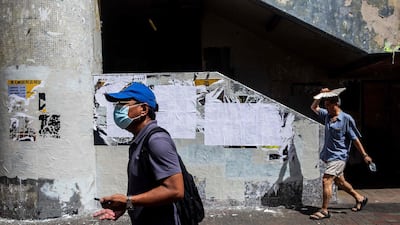Senior officials in Hong Kong said on Saturday they were "very disappointed" at Canada's decision to suspend its extradition treaty with the Chinese-ruled city and again slammed Washington for "interfering" in its affairs.
Beijing imposed a new national security law this week on the former British colony, despite protests from Hong Kong residents and Western nations, setting China's freest city and a major financial hub on a more authoritarian track.
"The Canadian government needs to explain to the rule of law, and explain to the world, why it allows fugitives not to bear their legal responsibilities," Hong Kong's security chief, John Lee, told a radio programme on Saturday.
Mr Lee was very disappointed and strongly opposed Canada's move, he added, as it let politics override the rule of law.
The comments followed Canada's statement on Friday that it was suspending the treaty with Hong Kong in the wake of the new law and could boost immigration from the city.
Canada would also bar the export of sensitive military items to Hong Kong, Prime Minister Justin Trudeau told reporters.
"Canada is a firm believer in the 'one country, two systems' framework," Prime Minister Justin Trudeau said, referring to the semi-autonomous model adopted after Britain returned Hong Kong to China in 1997.
"We're extremely concerned about the situation in Hong Kong," he told a press briefing.
Mr Trudeau said the "one country, two systems" principle was important not just for the city's 7.5 million people, but for the 300,000 Canadians who live there.
"That is why we are going to continue to look at steps we can take to ensure the safety of its citizens," he said, mentioning possible new "immigration" measures, without any specifics.
The Chinese legislation enacted this week outlaws acts of subversion, secession, terrorism and colluding with foreign forces.
Beijing has faced a groundswell of criticism, primarily from Western nations, over the law, which radically increases China's control over Hong Kong.
China's leaders say the suite of powers will restore stability after a year of sometimes violent protests and will not stifle freedoms.
But police have already begun arresting people for possessing protest flags and banners, and the government in Hong Kong has made clear certain political views, especially calls for independence, are now outlawed.

